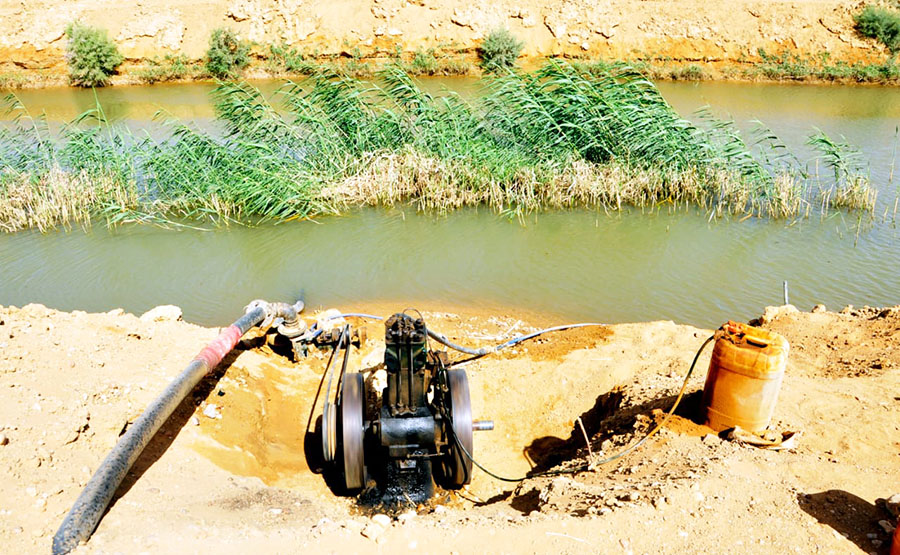
Thirst Threatens Food Security in Sudan
Source: Independent Arabia
The successive targeting of power plants in Sudan by Rapid Support Forces (RSF) drones has disrupted citizens lives, paralyzed industries, and inflicted severe damage on the agricultural sector. Thirst has caused hundreds of projects to burn down and most of their crops to be destroyed, particularly in the Rahad area and Northern State, which are currently the countrys largest food and economic source. This is especially true after the Gezira, Rahad, and Habila projects went out of production due to the repercussions of the war.
The power outage crisis, which has lasted for more than three months, has compounded the suffering of farmers and inflicted heavy losses, particularly after the Merowe Dam, the countrys largest dam, was targeted. This threatens a major food gap in the coming period, with 40 percent of the wheat crop in northern Sudan destroyed.
A Catastrophic Situation
Farmer Hussein Al-Shaigi said, "The targeting of the Merowe Dam and the power plant led to power outages in large parts of Northern State for more than three months. The situation has contributed to the burning of agricultural projects due to thirst and the destruction of all crops."
He added, "The vegetables died before they ripened due to the water scarcity, and we lost almost everything this season. Therefore, the situation portends a catastrophe that threatens food security in the region, as well as the livelihoods of the population who depend on agriculture."
Al-Shaigi explained that "the cost of financing solar panels from the Agricultural Bank for projects in the Northern State has increased to an unprecedented level, reaching 33 percent, doubling the price of the panels from 50 to 100 million Sudanese pounds (40,000 US dollars), payable over three years."
Losses and Damages
Farmer Al-Fatih Suleiman pointed out that "the damage caused by the electricity crisis to crops in the Ab Dom Agricultural Project, west of the city of Ad-Daba in northern Sudan, was significant, especially after the destruction of strategic crops that impact consumers and peoples livelihoods, due to their high daily demand, such as wheat and various vegetables."
Suleiman noted that "this disaster requires the state to develop a scientific vision to deal with such circumstances, especially since the majority of Sudanese people now depend on projects in the Northern State, especially after the Gezira, Rahad, and Habila projects went out of production due to the prolonged war."
Wheat Damage
For his part, Sumi Khalil, a farmer in the Arak project in the Merowe area, said, "The wheat crop has suffered significant losses due to thirst, with up to 40 percent of the cultivated area destroyed."
He explained that, "In the absence of electricity, the cost of irrigating two acres per week has reached 280,000 Sudanese pounds (100 US dollars), at a time when the crop cycle requires three irrigations."
Khalil noted that "economically capable farmers have resorted to purchasing solar panels to operate generators that pump water to agricultural projects, in an attempt to save crops from thirst."
Complex Crises
In a related development, Atef Mahmoud, Director General of the Rahad Agricultural Project Authority, stated that "losses have reached 65 million," and he called on the government to intervene to address the electricity problems.
He added that "the project needs more than two million cubic meters of water to irrigate 353,000 acres, which is difficult to achieve given the institutional collapse and scarce resources."
Meanwhile, Abdel Azim Abdel Baqi, head of the Farmers Organization, pointed out that "there are urgent resources that must be available to save the project, namely the importance of a stable electricity supply, as well as addressing vulnerable areas that threaten digital villages with submergence if water levels rise."
Economic Impact
In a related context, Idris Al-Zubair, an economic expert, considered that "the governments inability to resolve the electricity crisis is questionable, especially more than three months after the Merowe Dam was targeted. He also emphasized the importance of electricity and water, as they are integral to the production cycle."
He stated that "since the outbreak of the war, the government has lacked a plan and strategy to address the issue of food security, despite the largest agricultural projects being excluded from the production cycle in the states of Gezira, Gedaref, and South Kordofan."

